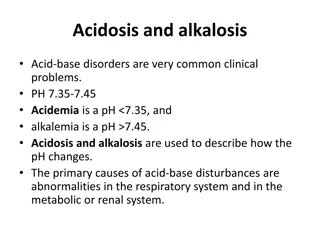Terminal Base, Air Terminal Base, Lightning Rod Terminal Base, Lightning Rod Bas
Nexus Metal & Alloys: We are Manufacturer, Supplier and Exporter of Terminal Base, Air Terminal Base, Lightning Rod Terminal Base, Lightning Rod Base, Electrical Terminals Base, Solid Terminal Base, Black Terminal Base etc from Khetwadi, Maharashtra, India. We Export to Worldwide.
2 views • 3 slides
Aspirin Assay by Direct Acid-Base Titration Experiment Overview
Exploring the process of assessing aspirin purity through direct acid-base titration using sodium hydroxide as a standard solution. The experiment includes details on aspirin properties, dosage, acidity, decomposition, and metabolism. Key aspects covered include the aim of the experiment, the princi
5 views • 15 slides
Best Acetic Acid Glacial Manufacturer Company - Modi Chemical
Modi Chemical stands out as the premier acetic acid glacial manufacturer, dedicated to delivering top-notch quality and unmatched customer service. With a strong focus on sustainability and innovation, Modi Chemical has become the go-to source for high-purity acetic acid glacial, catering to a wide
2 views • 1 slides
M-TOLUIC ACID Manufacturer in Gujarat - Modi Chemical
Modi Chemical is the top m-toluic acid manufacturer in Gujarat, renowned for delivering high-quality, pure m-toluic acid. Our state-of-the-art facilities and stringent quality control ensure exceptional product consistency and reliability. Committed to sustainability and innovation, we serve a wide
0 views • 1 slides
Industrial Production of Citric Acid and Microbial Fermentation
Industrial production of citric acid has evolved from extraction processes to microbial fermentation, offering various industrial applications. Citric acid is utilized as an acidulant in food and pharmaceutical industries, a chelating agent in tanning, and a flavor enhancer in carbonated beverages.
1 views • 18 slides
Understanding Acid-Base Balance in Health and Disease
Many critical illnesses can disrupt acid-base balance, indicating underlying diseases or organ damage. Interpretation of disturbances requires analyzing arterial blood gases, plasma electrolytes, and compensatory mechanisms. Acid-base disorders are classified into respiratory acidosis, respiratory a
3 views • 26 slides
Understanding Acid-Base Balance in the Body: Importance and Regulation
Acid-base balance is crucial for maintaining optimal health, as slight deviations in hydrogen ion concentration can impact enzyme activity and metabolic processes. The body employs various defense mechanisms to regulate pH levels, involving buffers, lungs, and kidneys. Strong acids release more H+ i
1 views • 48 slides
Industrial Production of Citric Acid: Fermentation Processes and Applications
Citric acid is industrially produced through microbial fermentation processes. It is widely used in various industries such as food, pharmaceuticals, and beverage production. Different methods like surface culture fermentation are employed for citric acid manufacture, with fungi like Aspergillus nig
4 views • 18 slides
Limit Test of Iron Based on Color Reaction with Thioglycollic Acid
The limit test for iron involves the reaction of iron in ammoniacal solution with citric acid and thioglycollic acid to form a reddish-purple color. By comparing the color produced with a standard solution, the presence of iron is determined. Citric acid prevents precipitation of iron, while thiogly
1 views • 5 slides
Understanding the Impact of Acid Rain on Ecosystems
Investigate the effects of acid rain caused by fossil fuel combustion on water acidity, plant life, animals, and structures. Learn how nitrogen oxides and sulfur dioxide create acid solutions in the atmosphere, affecting watersheds and sensitive ecosystems. Explore the devastating consequences of ac
1 views • 20 slides
Overview of Ammonium Chloride: Properties, Preparation, and Uses
Ammonium Chloride, with the formula NH4Cl, is a compound containing not less than 99.5% NH4Cl. It is prepared commercially by neutralizing ammonia with hydrochloric acid or treating ammoniacal gas liquors with lime. The compound is essential for maintaining acid-base equilibrium, acts as an expector
2 views • 4 slides
Determination of Acetic Acid Content in Vinegar Experiment
The experiment aims to measure the total acid concentration in a specific brand of vinegar through a titration process using NaOH solution. The procedure involves titrating the vinegar solution with NaOH until a pink color appears, calculating the concentration of acetic acid, and determining the pe
2 views • 8 slides
The Production and Uses of Acetic Acid: From Ancient Practices to Modern Applications
The production of acetic acid, specifically in the form of vinegar, has a long history dating back to ancient times. Vinegar was utilized for various purposes such as a food condiment, treating wounds, and addressing different illnesses. Today, acetic acid is mainly used in the food industry for con
1 views • 17 slides
Overview of Lactic Acid Production and Applications
Lactic acid occurs in two isomeric forms and has various applications in food, pharmaceuticals, and skincare industries. It is primarily produced through the fermentation of sugars by microorganisms. The production process involves using raw materials like purified sugars and agricultural wastes. Th
3 views • 11 slides
Understanding Enzyme Catalysis and Active Site Role
Enzymes play a crucial role in catalyzing biochemical reactions by stabilizing transition states through their active sites. Different mechanisms like acid-base, covalent, metal, and electrostatic interactions are employed for stabilization. Acid-base catalysis involves acceleration without being co
1 views • 21 slides
Understanding Acid-Base Disturbances in Medical Practice
Explore the intricacies of acid-base physiology, mechanisms, and interpretation, along with the life-saving roles of blood buffers, respiratory reactions, and renal mechanisms. Learn how to handle acid loads and interpret abnormalities confidently, guided by expert insights.
1 views • 29 slides
Synthesis of Salicylic Acid: Theory, Derivatives, and Applications
Salicylic acid is synthesized from methyl salicylate through ester hydrolysis with aqueous alkali. It is a versatile compound used in organic synthesis, as a plant hormone, and derived from salicin metabolism. The derivatives of salicylic acid can minimize gastric disturbances and enhance therapeuti
4 views • 12 slides
Understanding Acid-Base Titration in Chemistry
Acid-base titration is a quantitative technique used to determine the concentration of an unknown acid or base solution. By neutralizing the solution with the opposite component and reaching the equivalence point, students can calculate the concentration using stoichiometry principles. This method d
0 views • 24 slides
Overview of Salicylic Acid and its Derivatives
Salicylic acid is known for its antiseptic, germicidal, and analgesic properties, used in various applications such as preservatives, wart treatments, and pain relief. Different derivatives of salicylic acid are developed to minimize side effects and enhance efficacy. Acetyl salicylic acid (ASA), co
0 views • 15 slides
Role of Major Physiological Anions in the Human Body
Physiological anions such as chlorides, sulphates, bicarbonate, phosphates, and electrolytes play essential roles in maintaining various functions within the body. Chloride ions help in osmotic balance, charge balance, and acid-base balance. Sulphates are important for detoxification mechanisms and
0 views • 11 slides
Understanding Acid-Base Disorders in Critical Care
Explore the intricate details of acid-base disorders, including metabolic acidosis with anion gap, high and normal anion gap metabolic acidosis, causes of lactic acidosis, and important considerations like hypoalbuminemia. Learn about the delta ratio and how to interpret it in the context of acid-ba
0 views • 31 slides
Comprehensive Guide to Acid-Base Disorders Interpretation
This comprehensive guide provides a systematic approach to interpreting arterial blood gas (ABG) samples, including multiple formulas and rules to navigate complex diagnoses. It outlines five essential steps in acid-base analysis and emphasizes the importance of routine application for improving pat
0 views • 50 slides
Understanding Acid-Base Titration in Chemistry
Acid-base titration is a quantitative technique used to determine the concentration of unknown acids or bases. Through neutralization reactions, the concentration of a solution can be calculated based on the stoichiometry of the reaction. This method dates back to the late 18th century and is crucia
0 views • 24 slides
Important Bacterial Groups in Food
Bacteria play a crucial role in food, with various groups such as Lactic Acid Bacteria, Acetic Acid Bacteria, Propionic Acid Bacteria, Butyric Acid Bacteria, Proteolytic Bacteria, Lipolytic Bacteria, Saccharolytic Bacteria, and Pectinolytic Bacteria identified for their specific roles in food fermen
0 views • 17 slides
Lactic Acid Fermentation in Food Industry
Lactic acid fermentation is a widely used method for producing fermented foods like dairy, vegetables, and meats. This process involves lactic acid bacteria and filamentous fungi to convert sugars into lactic acid. Various microbial cultures are utilized, and raw materials such as whey, molasses, an
0 views • 23 slides
Understanding Acid-Base Balance in Patients
Explore the assessment and care of patients with acid-base imbalances, including the importance of normal blood pH levels, the role of acids and bases in body chemistry, and the calculation of free hydrogen ion levels. Discover how acid-base balance is maintained and the critical impact of pH change
0 views • 41 slides
Understanding Purine Degradation and Gout
Purine degradation pathway involves the breakdown of dietary nucleic acids, mainly from meat, into uric acid through specific enzymatic steps. Excessive uric acid production can lead to conditions like gout and hyperuricemia. Humans excrete uric acid in the urine as the final product, while other an
0 views • 12 slides
Understanding Acid-Base Physiology in the Human Body
Acid-Base homeostasis plays a crucial role in maintaining the optimal acidity of body fluids through a balance of chemical buffers and physiological processes. Disruptions in this balance can lead to various effects on the central nervous system and ionized calcium levels. Understanding the concepts
0 views • 21 slides
Understanding Acid-Base Balance and Regulation in the Body
Acid-base balance is crucial for maintaining optimal physiological functions. This content explains the definitions of acids and bases, differentiates between strong and weak varieties, explores the significance of pH control in body fluids, and delves into the roles of buffers, kidneys, and lungs i
0 views • 20 slides
Understanding DiCarboxylic Acid: Properties, Preparation, and Uses
DiCarboxylic acid is an organic compound containing two carboxyl functional groups. Focus on Oxalic acid, its physical and chemical properties, preparation methods, and various applications including as a cleaning agent, in industrial processes, and potential medicinal uses. Learn about the unique c
0 views • 10 slides
Understanding Acidosis and Alkalosis in Acid-Base Disorders
Acid-base disorders, involving acidosis and alkalosis, are common in clinical practice. These conditions are characterized by changes in pH levels, with acidemia (pH < 7.35) and alkalemia (pH > 7.45) representing acidosis and alkalosis, respectively. The primary causes of these imbalances lie within
0 views • 17 slides
Factors Affecting Acid Strength: Atoms, Size, Hybridization, and Electronegativity
The strength of acids is influenced by various factors such as the atom on which the negative charge of the acid's conjugate base rests, atom size, hybridization, and electronegativity. The stability of negative charges on atoms, atom size allowing charge delocalization, preferred orbital types for
0 views • 23 slides
Laboratory Preparation of Nitric(V) Acid & Chemical Reactions
In this set of questions, we explore the preparation of nitric(V) acid in a school laboratory setting, its properties, and chemical reactions. Topics covered include the use of sodium nitrate(V) and potassium nitrate(V), the use of glass apparatus during the preparation process, color changes in con
0 views • 4 slides
Understanding Acid Rain and Its Environmental Impact
Exploring the phenomenon of acid rain, this activity investigates the effects of fossil fuel emissions on water acidity. By using a pH-meter sensor, participants create hypotheses and conduct experiments to understand what determines the pH of acid rain. Theoretical insights reveal how nitrogen oxid
1 views • 20 slides
Common Organic Acids and Their Uses in Various Industries
Citric acid, lactic acid, salicylic acid, and tartaric acid are natural acids found in various fruits. They have diverse applications in food and beverage, pharmaceutical, and cosmetic industries. These acids are used for flavoring, cleaning, as food additives, and in the preparation of various prod
0 views • 4 slides
Understanding Buffers in Pharmaceutical Formulations
Buffers in pharmacy play a critical role in maintaining constant pH levels essential for drug stability and efficacy. They resist pH changes by neutralizing added acids or bases, ensuring proper drug delivery and patient comfort. Common buffer systems, such as acetic acid/sodium acetate and boric ac
4 views • 18 slides
Equilibrium and Acid-Base Problems in Chemistry Lecture
In this lecture, topics such as Advanced Equilibrium, Acid/Base Equilibria, Systematic Method for solving chemical problems, Strong Acid/Strong Base scenarios, and General Comments on reactions are discussed. Examples using the systematic method are provided for practical understanding. Key points o
0 views • 13 slides
The Ultimate Guide to Salicylic Acid Cream for Clearer Skin
This article explores the benefits of salicylic acid cream, how it works, and the best options available in Pakistan. We\u2019ll also guide you on where to find the best salicylic acid products and what to consider when buying salicylic acid cream in
0 views • 4 slides
Top 5 Salicylic Acid Body Washes for Clear Skin
Salicylic acid, a powerful beta hydroxy acid (BHA), is known for its remarkable ability to fight acne and improve skin texture. As an ingredient commonly found in skincare products, salicylic acid body washes are particularly effective for treating b
0 views • 4 slides
Understanding Serum Uric Acid Levels and Hyperuricemia
Serum uric acid is a crucial marker of purine metabolism, with elevated levels indicating hyperuricemia which can lead to conditions like Gout. The measurement of serum uric acid helps in diagnosing hyperuricemia, with serum being the preferred specimen for testing. Various factors such as diet, gen
0 views • 12 slides







































